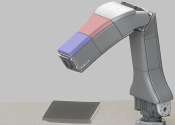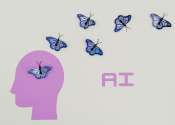AI's relentless rise gives journalists tough choices
The rise of artificial intelligence has forced an increasing number of journalists to grapple with the ethical and editorial challenges posed by the rapidly expanding technology.
Apr 20, 2024
0
16
Business

The rise of artificial intelligence has forced an increasing number of journalists to grapple with the ethical and editorial challenges posed by the rapidly expanding technology.
Apr 20, 2024
0
16
Business

Full disclosure: ChatGPT didn't write this—but theoretically, it could have. Generative AI has progressed to the point where its output seems comparable in style and quality to that of human content creators. At first glance, ...
Apr 18, 2024
0
18
Robotics

Soft skin coverings and touch sensors have emerged as a promising feature for robots that are both safer and more intuitive for human interaction, but they are expensive and difficult to make. A recent study demonstrates ...
Apr 17, 2024
0
47
Business

Amazon wants the public and—especially other businesses—to know it's not giving up on its Just Walk Out technology.
Apr 17, 2024
0
0
Business

A group of disappointed and angry Google employees protested outside a company building on April 16 after it was reported that the search giant had deepened a contract with the Israeli government.
Apr 17, 2024
0
8
Hi Tech & Innovation

Optical neural networks may provide the high-speed and large-capacity solution necessary to tackle challenging computing tasks. However, tapping their full potential will require further advances. One challenge is the reconfigurability ...
Apr 16, 2024
0
127
Hardware

A combined team of engineers from Tsinghua University and the Beijing National Research Center for Information Science and Technology, both in China, has developed a large-scale diffractive hybrid photonic AI chiplet for ...
Internet

Social media allows users to express themselves through words, pictures, videos and emojis, but some marginalized groups say social media platforms restrict the visibility of their online posts, according to a new University ...
Apr 16, 2024
0
7
Business

The future of artificial intelligence, technology to fight climate change and other glimpses at the cutting edge were in focus Tuesday as mega-tech conference Web Summit opened in Rio de Janeiro.
Apr 16, 2024
0
32
Automotive

A new Bar-Ilan University study addresses a fundamental question in the realm of artificial intelligence (AI): Can deep learning architectures achieve greatly above-average confidence for a significant portion of inputs while ...
Apr 15, 2024
0
1
A human is a member of a species of bipedal primates in the family Hominidae (taxonomically Homo sapiens—Latin: "wise man" or "knowing man"). DNA and fossil evidence indicates that modern humans originated in east Africa about 200,000 years ago . When compared to other animals and primates, humans have a highly developed brain, capable of abstract reasoning, language, introspection and problem solving. This mental capability, combined with an erect body carriage that frees the forelimbs (arms) for manipulating objects, has allowed humans to make far greater use of tools than any other species. Humans are distributed worldwide, with significant populations inhabiting most land areas of Earth. The human population on Earth is greater than 6.7 billion, as of February 2009,
Like most higher primates, humans are social by nature. Humans are particularly adept at utilizing systems of communication—primarily spoken, gestural, and written language—for self-expression, the exchange of ideas, and organization. Humans create complex social structures composed of many cooperating and competing groups, from families to nations. Social interactions between humans have established an extremely wide variety of traditions, rituals, ethics, values, social norms, and laws, which together form the basis of human society. Humans are distinctive as a species on the Earth by having a perception of beauty and aesthetics at least to a point which results in a material culture. This, when combined with the desire for self-expression and a proportionally large brain-size, has led to innovations such as art, written language, music and science.
Humans seek to understand and influence the environment around them by trying to explain and manipulate natural phenomena through philosophy, art, science, mythology, and religion. This natural curiosity has led to the development of advanced tools and skills. Although humans are not the only species to use tools, they are unique in building fires, cooking their food, and clothing themselves; as well as using other advanced technologies. Humans pass down their skills and knowledge to the next generations and so are regarded as dependent upon culture.
This text uses material from Wikipedia, licensed under CC BY-SA